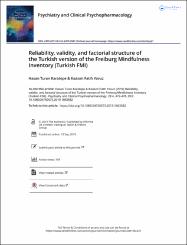| dc.contributor.author | Karatepe, Hasan Turan | |
| dc.contributor.author | Yavuz, Kaasım Fatih | |
| dc.date.accessioned | 2019-12-26T07:27:48Z | |
| dc.date.available | 2019-12-26T07:27:48Z | |
| dc.date.issued | 2019 | en_US |
| dc.identifier.citation | Karatepe, H. T. ve Yavuz, K. F. (2019). Reliability, validity, and factorial structure of the Turkish version of the Freiburg Mindfulness Inventory (Turkish FMI). Psychiatry and Clinical Psychopharmacology, 29(4) 472-478. https://doi.org/10.1080/24750573.2019.1663582 | en_US |
| dc.identifier.issn | 2475-0573 | |
| dc.identifier.issn | 2475-0581 | |
| dc.identifier.uri | https://doi.org/10.1080/24750573.2019.1663582 | |
| dc.identifier.uri | https://hdl.handle.net/20.500.12511/4713 | |
| dc.description.abstract | OBJECTIVES: Mindfulness is the awareness that emerges through paying attention on purpose, in the present moment, and nonjudgementally to the unfolding of experience moment to moment. Mindfulness-based interventions are frequently used in clinical situations and in establishing psychological well-being in a non-clinical sample as psychological techniques. Therefore, many mindfulness measures have been developed for use in clinical settings and for research purposes. Freiburg Mindfulness Inventory (FMI) is a self-report questionnaire that was developed to measure the trait mindfulness. In this study, we aimed to examine the validity, reliability, and factor structure of the FMI in a Turkish sample. METHODS: Participants were mostly college students (113 female, 93 male) and civil servants. Sociodemographic information, the Turkish version of the FMI, Acceptance and Action Questionnaire-II (AAQ-II), Five Facets Mindfulness Questionnaire (FFMQ) - All statistical analyses were performed by using SPSS version 20 and AMOS 23 version. RESULTS: The Cronbach's alpha coefficient for the scale was 0.823, Guttman's split-half reliability coefficient was 0.828, and test-retest reliability coefficient was 0.895. A positive and statistically significant correlation was found between the Turkish FMI and FFMQ (r = 0.566, p = .000). We found negative and statistically significant results between FMI and AAQ-II scores (r = -0.519 p = .000). We found strong statistical fit indices that can be acceptable for one-factor solution confirmatory factor analysis. CONCLUSIONS: The Turkish version of the FMI has satisfactory convergent and divergent validity, good internal and test-retest reliability with one-factor structure to use in a Turkish sample. We hope that Turkish form of FMI, which is known to be effective in assessing the mindfulness especially in a population that is familiar with the mindfulness practices, will be a useful alternative instrument for Turkish clinicians and researchers. | en_US |
| dc.language.iso | eng | en_US |
| dc.publisher | Taylor & Francis | en_US |
| dc.rights | info:eu-repo/semantics/openAccess | en_US |
| dc.rights | Attribution 4.0 International | * |
| dc.rights.uri | https://creativecommons.org/licenses/by/4.0/ | * |
| dc.subject | Mindfulness Measurement | en_US |
| dc.subject | Acceptance | en_US |
| dc.subject | Validity Measurement | en_US |
| dc.subject | Acceptance and Commitment Therapy | en_US |
| dc.subject | Mindfulness | en_US |
| dc.subject | Factorial Analyses | en_US |
| dc.title | Reliability, validity, and factorial structure of the Turkish version of the Freiburg Mindfulness Inventory (Turkish FMI) | en_US |
| dc.type | article | en_US |
| dc.relation.ispartof | Psychiatry and Clinical Psychopharmacology | en_US |
| dc.department | İstanbul Medipol Üniversitesi, İnsan ve Toplum Bilimleri Fakültesi, Psikoloji Bölümü | en_US |
| dc.authorid | 0000-0003-3862-2705 | en_US |
| dc.identifier.volume | 29 | en_US |
| dc.identifier.issue | 4 | en_US |
| dc.identifier.startpage | 472 | en_US |
| dc.identifier.endpage | 478 | en_US |
| dc.relation.publicationcategory | Makale - Uluslararası Hakemli Dergi - Kurum Öğretim Elemanı | en_US |
| dc.identifier.doi | 10.1080/24750573.2019.1663582 | en_US |
| dc.identifier.wosquality | Q4 | en_US |
| dc.identifier.scopusquality | Q3 | en_US |



















